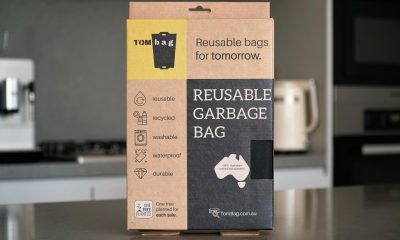Business
Why new companies are investing in eco-friendly strategies
As consumers are becoming more environmentally responsible, eco-friendly strategies and policies are changing the game by which businesses operate.

Sustainability and eco-friendly business practices have become an important part of investment strategies, for companies ranging from small crowdfunded startups to larger private equity houses with growing portfolios.
Retailers, manufacturers, investors and private equity (PE) firms understand that a growing customer imperative calls for greater transparency, social responsibility and more sustainable and environmentally friendly practices. Doing so isn’t just about PR or feeling good — it’s a new marketplace.
For everything from fast-casual restaurant chains to the manufacture of home goods, those involved in start-up investments are realizing that an environmentally friendly strategy belongs in the business plan from the very beginning. Its inclusion is essential to bottom-line success and the company’s ability to appeal to a new demographic that demands it.
“There are two things that are powerful that we do to bring customers back,” said Seth Hirschel, co-founder of franchised Salsa Fresca Mexican Grill, a chain of fast-casual restaurants in New York and Connecticut. “Obviously, they love the food. But they really care about the dedication to what we’re doing towards the planet. And we see that in every store.” Salsa Fresca’s eco-friendly policies range from compostable bowls and forks made from plant starch to the buildings themselves, which use energy-saving lighting and heating, ventilation and air conditioning (HVAC) units.
The appeal to consumers is unmistakable. Startup Sheets & Giggles, whose founder Colin McIntosh obviously loves puns, tapped into the consumer demand for products created using sustainable agriculture, launching a line of bedsheets made with eucalyptus instead of cotton (which requires a large amount of agricultural pesticides and water). Demand for pesticide-free home products is so great that the startup’s Indiegogo page reached its initial goal of $25,000 within four hours of launch and exceeded $100,000 within just a few days. According to McIntosh, “From the beginning, we recognized that we are seeing a new normal. Companies aren’t just embracing eco-friendly strategies because of the ‘cool factor,’ they’re doing so because the market will pay a premium for higher-end, sustainable products, which in turn allows us to achieve greater profitability.”

Some companies like Bain Capital are supporting eco-friendly firms like a landscaping-materials recycler. (Source)
“As a business and investment strategy, ‘going green’ will have an impact on the entire supply chain ecosystem, and consequently, must be considered in the very early stages,” added McIntosh. “In marketing, of course it’s essential to not just ‘go green,’ but to tell the world about it – we’ve found that especially in younger demographics, environmentally-friendly practices play a larger role than ever in buying decisions.”
In a blog in MIT Sloan Management Review, author Paul Michelman comments that aside from concerns about protecting the planet and our health, moves away from eco-friendly practices “often contradict the organization’s own best interests. Sustainable business practices are good for the bottom line.” The blog goes on to suggest that “the financial value of environmental responsibility remains dangerously underappreciated and misunderstood.”
While early-stage entrepreneurs like McIntosh are rushing to embrace eco-friendly strategies, PE firms are also in a strong position to do the same. Traditionally stodgy PE firms like Bain Capital are even getting in on the trend, backing eco-friendly firms like a landscaping-materials recycler and a fitness company targeting underserved communities.
It’s interesting to note that in both instances, Bain isn’t just trying to make themselves look good — they’re setting the same financial return targets as they would with more traditional companies. Indeed, PE firms, which operate on a longer cycle than startups or public companies, are the best-positioned of all to prioritize investments in companies that have embraced these green strategies.
In the hospitality industry, hotel chains are making similar investments, with an eye towards two bottom-line results: attracting the attention of customers looking for hotel brands with environmentally friendly policies and enhancing their own bottom lines.
More hoteliers are beginning to incorporate eco-friendly smart technologies, which have the positive result of cutting costs on key operating expenses like HVAC. A recent pilot program led to significant efficiencies from just such smart policies, yielding $60,000 in annual savings from a single location.
In this era of a new normal of eco-friendly policies — driven not only by a desire to do good but also by a desire to attract customers who increasingly appreciate and demand such policies — startups, entrepreneurs, investors and PE firms are changing the game. Business plans and investment strategies must now include a look at these strategies as a means of sustainable growth and profitability.
(Featured image by DepositPhotos)
—
DISCLAIMER: This article expresses my own ideas and opinions. Any information I have shared are from sources that I believe to be reliable and accurate. I did not receive any financial compensation for writing this post, nor do I own any shares in any company I’ve mentioned. I encourage any reader to do their own diligent research first before making any investment decisions.

-

 Crowdfunding2 weeks ago
Crowdfunding2 weeks agoAWOL Vision’s Aetherion Projectors Raise Millions on Kickstarter
-

 Impact Investing6 days ago
Impact Investing6 days agoItaly’s Listed Companies Reach Strong ESG Compliance, Led by Banks and Utilities
-

 Impact Investing2 weeks ago
Impact Investing2 weeks agoBNP Paribas Delivers Record 2025 Results and Surpasses Sustainable Finance Targets
-

 Impact Investing3 days ago
Impact Investing3 days agoCDP Approves €1.5 Billion Package to Boost Industry, Renewables, and International Development








![Kevin Harrington - 1.5 Minutes to a Lifetime of Wealth [OTC: RSTN]](https://born2invest.com/wp-content/uploads/2023/12/kevin-harrington-400x240.jpg)
![Kevin Harrington - 1.5 Minutes to a Lifetime of Wealth [OTC: RSTN]](https://born2invest.com/wp-content/uploads/2023/12/kevin-harrington-80x80.jpg)
















You must be logged in to post a comment Login